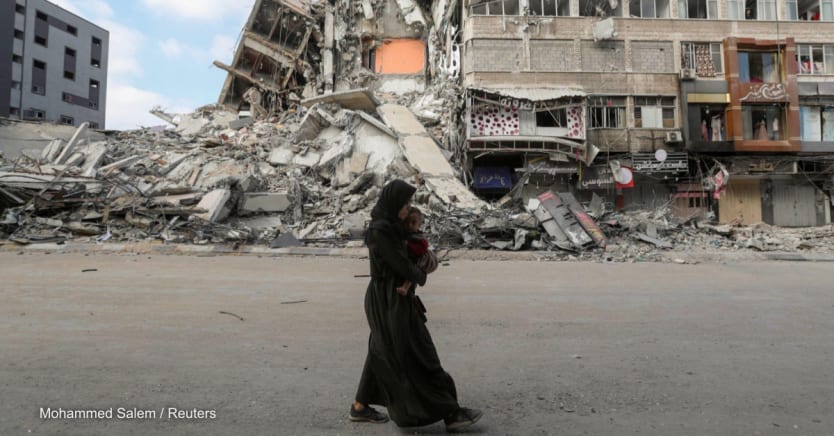
A few days ago, Mahmoud Shalabi, senior program manager for the nonprofit Medical Aid for Palestinians, ventured out alone to his organization’s warehouse in the Gaza Strip to help retrieve pharmaceutical drugs and other medical items. The once-routine journey was terrifying, Shalabi said.
“There were no cars to take me to the warehouse. I was alone in the street, and bombardments and airstrikes were happening as I was walking,” Shalabi said. “But these are lifesaving items, and if you do not have this strategic stockpile, then many lives will be endangered even further.”
Nearly two weeks after the latest conflict between Israel and Hamas broke out, all nonessential development work has stopped in Gaza, according to Shalabi, as the United Nations’ Palestinian refugee agency, or UNRWA, and other groups have quickly pivoted to focus solely on emergency response. At least 227 people have been killed in Gaza, according to Palestinian health officials, while Hamas rockets have killed at least 12 people in Israel.
Medical Aid for Palestinians is among the NGOs operating in Gaza that are asking all staffers to work from home and have temporarily closed their offices, suspending ongoing projects such as blood drives.
“Everyone is just staying home. It is extremely dangerous for people to go outside and move. The best you can do is go to your local shop, and even that is extremely dangerous,” Shalabi said.
“We are running towards a critical point where there’s not enough food in Gaza and the humanitarian supplies are running low.”
— Matthias Schmale, Gaza director, UNRWAThe Israeli Security Cabinet approved a cease-fire to end the 11-day military offensive in the Gaza Strip, Israeli media reported Thursday. Details about what this will look like are still emerging.
The exact duration of a cease-fire will help determine how quickly routine humanitarian and development operations can resume, Shalabi said.
Several health clinics, including a trauma and burn clinic operated by Médecins Sans Frontières, closed this week, following Israeli airstrike bombardments. Airstrikes also damaged Gaza’s COVID-19 testing facility. Mohammed Abu Mughaiseeb, deputy medical coordinator in Gaza at MSF, said the damage to the clinic left him “speechless.”
The continuation of other humanitarian work in Gaza is also not a given without steady access to humanitarian corridors or a deescalation in the airstrikes, according to Matthias Schmale, Gaza director at UNRWA. NGOs and agencies such as UNICEF have echoed the call for humanitarian corridors, along with a cease-fire, for the past several days.
Since Hamas took power in Gaza in 2007, Israel and Egypt have imposed a land, air, and sea blockade of the area. Some border crossings that typically enable humanitarian aid to flow from Israel to Gaza were closed during the latest outbreak of violence, Schmale said.
UNRWA briefly closed its health clinics last week because of security concerns. The agency is still not operating all of them, “because it is too dangerous in these particular spots,” Schmale said. “Safety and security of staff movement is really the dominant priority at the moment.”
UNRWA is presently focused on providing for the 56,000 displaced people who are sheltering in its schools, as well as keeping primary health centers and sanitation services operational.
UNRWA on Wednesday released an emergency appeal seeking $38 million to support the more than 1.4 million Palestinians in Gaza who are reliant on humanitarian aid — and the 72,000 Gazans who have now left their homes.
“We are running towards a critical point where there’s not enough food in Gaza and the humanitarian supplies are running low,” Schmale said. He spoke from a U.N. compound in the territory, amid the steady background noise of airstrikes less than a mile away.
After more than a week of Israeli border closures, UNRWA received its first shipment of fuel from Israel on Wednesday, according to Schmale.
“But if this doesn’t happen more regularly — today, I think, nothing came in,” Schmale said Wednesday. “It’s been OK for the first week, roughly, in terms of humanitarian aid. But if this now lasts much longer, electricity will become a problem because fuel is not getting in. And then food and water will go and medical supplies will become issues soon, too.”
Medical gloves are no longer available in Gaza, and other essential medical supplies are also needed, according to Shalabi.
“The lack of drugs and medical equipment means, basically, inadequate health care, as simple as that,” said Shalabi, noting that border closures prevent Gaza residents from seeking health care elsewhere.
After a cease-fire goes into effect, it could take months for development work in Gaza to regain its footing once emergency response and recovery efforts eventually subside, according to Shalabi. But the status quo is also inadequate, he said.
“The level we were at before was not good. We had 80% of the population dependent on foreign aid, the unemployment reached 61% — the highest in the world — and 95% of the water in Gaza is not good for human use,” Shalabi said. “The list goes on. That is what we want to bounce back to.”








